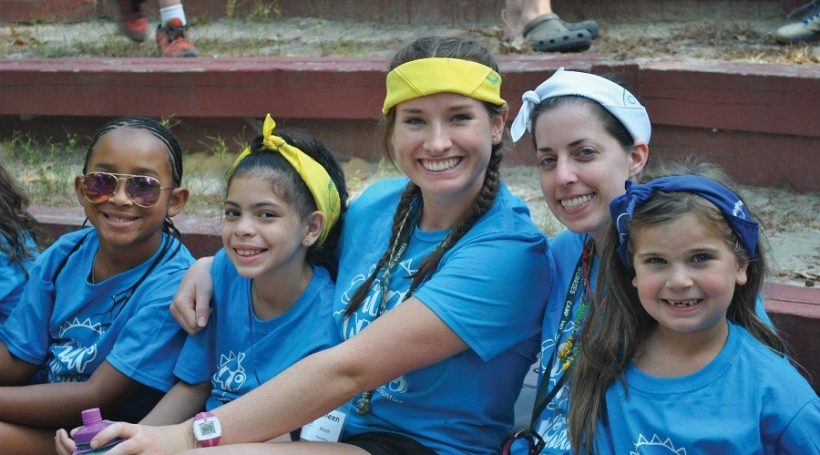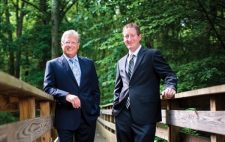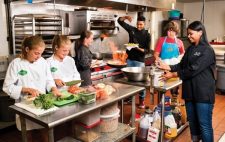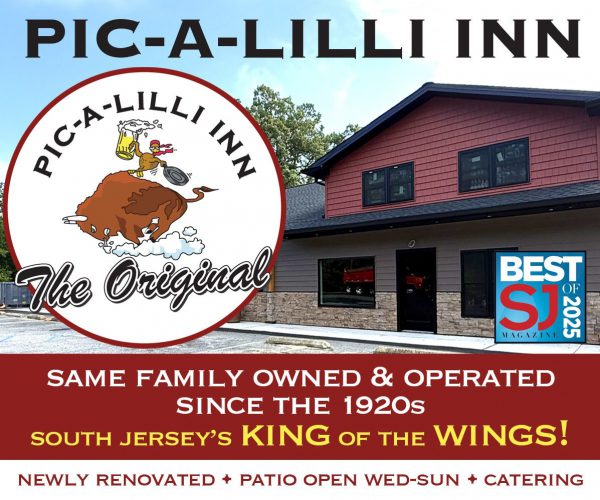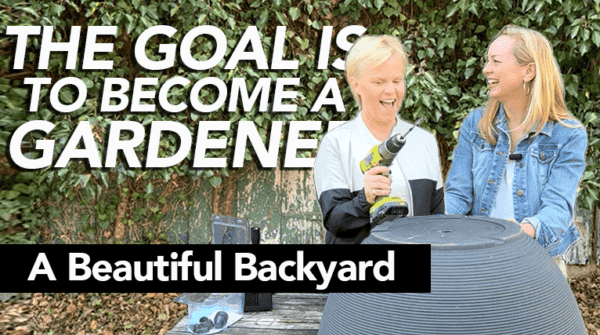Photography by Kerry Walsh
At first glance, the kids running, paddling, swimming and laughing on the grounds of Tabernacle’s Camp Inawendiwin look like any other campers. They participate in arts and crafts, race through scavenger hunts and get super competitive during color wars.
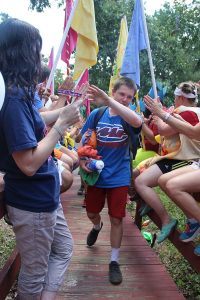
Ben Anenberg is a 10-year veteran of Camp No Worries
But throughout the day, many of them will duck into the camp’s medical cabin to receive their daily medication. Some wear hats or bandanas to protect their newly bald heads from the early summer sun. To get to the dining hall, they walk past trees hung with colorful spheres that bear the names of those who aren’t coming back to camp this year.
This is Camp No Worries, a weeklong reprieve for kids with cancer, their siblings and those who have lost a sibling to the disease. Campers range in age from 6 to 16, and many of the older campers have been attending for years. Staff members, including a number of medical professionals, are all volunteers, and every camper attends at absolutely no cost to their family.
Ben Anenberg, 16, says he was too young to fully comprehend the implications when he was diagnosed with acute lymphoblastic leukemia (ALL) in 2006. As a 10-year veteran of Camp No Worries, Anenberg says he’s come to understand how meaningful the week is, particularly for younger patients and their siblings.
“I was so young I didn’t really grasp what my diagnosis meant,” says Anenberg, who lives in Medford. “Now I see what goes into treating kids at camp. The fact that they can take kids who are still in treatment, let them come to camp and enjoy themselves is amazing. Their medical needs are taken care of, and they can focus on playing games and just enjoying the experience of being there, without having to think about their cancer all the time. That’s a gift.”
The opportunity to stop worrying about cancer for a week was exactly what Kasey Hall-Massa, 41, was trying to provide when she founded the camp 22 years ago. The inspiration behind Camp No Worries came to Hall-Massa even earlier – when she was diagnosed with a brain tumor at the beginning of summer. She was 11.
“I was your average 11-year-old in May of 1986, getting ready for summer, when I started having seizures,” Hall-Massa says. “Things happened quickly. In June I was diagnosed, and surgery was scheduled for July. All I really remember is being told all the things I could no longer do. I remember it as a time that was full of disappointment for so many reasons and not just for me. It was hard for my younger siblings to understand why our summer plans had to change so drastically.”
Nearly a decade later, Hall-Massa was studying childhood development in college when she approached her parents about starting the camp. They helped her approach rotaries, churches, friends and family to ask for funding, making sure the young college freshman spoke to each group personally. That first year, Camp No Worries hosted a four-day camp for 14 kids.
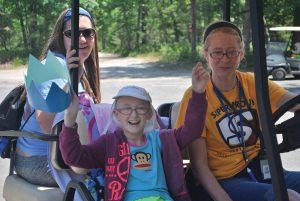 This year, 87 children and teens attended the camp at a cost of nearly $1,000 per camper, all of which is covered by donations.
This year, 87 children and teens attended the camp at a cost of nearly $1,000 per camper, all of which is covered by donations.
“When we first started, we reached out to the local papers, and people started sending us checks for $5 or $10,” Hall-Massa says. “Some of those same people still support us today. The community has really adopted this program, and the support isn’t just limited to donations. Our campers used to be referred to us by the hospitals, but now they’re coming from schools, neighbors, other families; that’s very unique, and it makes me feel good that parents are encouraging new families to come.”
Anenberg’s ALL went into remission in 2008, but he and his brother, who’s two years younger, have returned to Camp No Worries summer after summer.
“I think having leukemia shaped who I am,” Anenberg says. “It’s shaped a lot of people at camp. That’s why it’s so cool to go and be able to connect to those people and relate to them. They know what you’ve gone through. I also think it’s a lot of mental help for people who are still in the fight, to see the people who have done it and been there and come out the other side.”
Anenberg’s voice cracks just a little bit when he speaks about former campers who have passed away. Each year, early in the week, the camp joins together in a remembrance ceremony. Anenberg says it’s important to celebrate those campers’ lives and to have fun in their memory.
“You have to have a good time for the ones who can’t,” he says. “We’ve all faced that. We’ve lost friends, there are campers who have lost siblings. We do the ceremony, and then we try to move on and have a good time. That’s a message you can take away from camp – to really live life while you have it, because it’s something that cancer can take away.”
Hall-Massa says those remembrances are especially poignant for the parents of former campers. She frequently makes it a point to reach out to those families and let them know their child’s memory is alive and well at Camp No Worries.
“The biggest fear for a parent is that their child will be forgotten,” Hall-Massa says.
“We make sure we’re letting them know their child will never be forgotten. We’re also providing a safe environment for kids to express themselves. At home, a bereaved sibling might keep some things in because they don’t want to make mom or dad more upset. If they made a friend the year before that didn’t survive their illness, it’s OK to ask ‘Where is so-and-so?’ It’s normal. This is a reality of their world.”
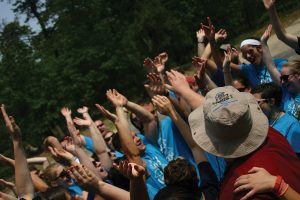 Dave Uth, a former camper and longtime counselor, says campers benefit from simply feeling like normal kids for a week, because everyone around them has dealt or is dealing with the same things.
Dave Uth, a former camper and longtime counselor, says campers benefit from simply feeling like normal kids for a week, because everyone around them has dealt or is dealing with the same things.
“Outside of camp, what they’re going through has been normalized to them, but not to everybody else. To everybody else, they’re still ‘the kid with leukemia,’” says Uth, 27. “Here, it’s normal for everybody, and that’s the magic of camp. It’s interesting to hear kids swapping chemo stories the way we talk about the weather. That’s the norm here, and that’s exactly what it’s about.”
Uth, a Medford native, first came to Camp No Worries at age 10 alongside his brother, who’d been diagnosed with cancer as an 8-year-old. His brother beat cancer, and Uth, now a design engineer at Kennedy Space Center, takes a week off work every year for camp.
“The reason I keep coming back to camp is I had so many great moments, experiences and relationships here,” Uth says. “Part of what I do is transitioning older campers to become counselors. Everybody has reasons for coming back that are a little different, but it’s always along the same vein of, ‘This was fantastic for us, we value what we got out of it, and we want to give back.’”
Anenberg, a rising junior at Shawnee High School, graduated from Camp No Worries last month. Next summer, he’ll be back for the camp’s Leader-in-Training program, a precursor to becoming a counselor himself.
“I’ve been the camper and had all the fun,” he says. “I would like to stay involved and be able to help and give back to camp. I want to help more kids have a good time every year, like I’ve done for the last 10 years.”
Anenberg’s not the only one; he says a number of his fellow campers will also be returning. No matter how old they get or where life takes them, he says, they have no intention of leaving behind such an important part of their lives.
“We’ve been coming here for five, seven, even 10 years. A lot of them are tied into camp just as deeply as I am,” Anenberg says. “That’s something not just with campers, but counselors and staff – that’s how we talk about camp. It’s a part of us. We’re a family.”

